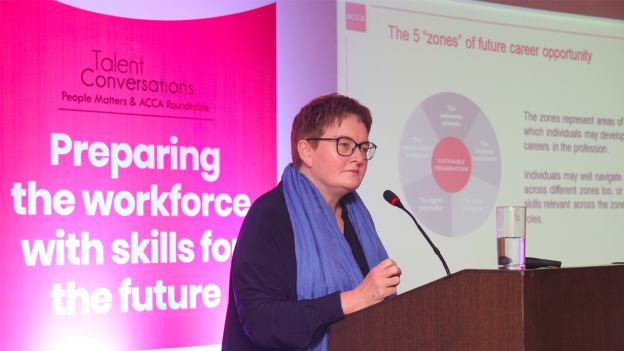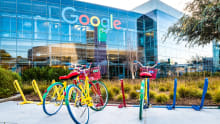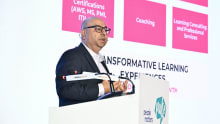Skilling right today, for a better tomorrow

Apart from technology being the primary force that is transforming the world of work and people, other global forces are at play as well, which give rise to the pressing need of focusing on preparing the workforce with skills for the future of work.
ACCA’s Chief Executive, Helen Brand, focused on global factors such as “globalisation and protectionism, the changing expectations of individuals in the workplace, shifting social morals and values, new types and levels of connectivity and demographics,” that are not only posing certain challenges for the business world but also providing opportunities to talent leaders to draft a new constitution for building the skills of tomorrow.
“The greatest imperative facing organizations in the face of all this change--first, is to survive and then, is to be sustainable in the future,” said Helen Brand during her keynote address at the People Matters and ACCA Roundtable on the topic, “Preparing the workforce with skills for the future.”
According to the Future ready: Accountancy careers in the 2020s research published by ACCA, sustainable organizations can be created in the future of work by keeping in mind a few “zones” or areas of opportunity where employees can focus on in order to progress. Career paths are set to become diverse and the lines between personal and professional lives will become blurry.
Career adaptation, skills transformation, and learning evolution are going to be the key instruments of change that will set up organizations for success in a rapidly transforming world. Thus, the imperatives for the accountancy careers in the 2020s include forging sustainable organizations.
When discussing about the major issues that remain at the forefront of the talent agenda of the future, Kush Ahuja, Head of Business Development, ACCA, along with Ester Martinez, CEO and Editor-in-Chief, People Matters, opened up the discussion for topics such as top skills that would be absolutely essential in the future, assessing the gaps between what leaders can acquire from the market at this point in time versus what is absolutely necessary in terms of preparing for the future demands, understanding what organizations are doing in order to bridge the skills gap and nurture talent, in addition to identifying the skillsets expected from a new hire vs. an experienced hire.
Kamaljeet Kaur, Head HR, Sterlite Power, highlighted that a blend of tech and touch is going to be crucial in preparing the workforce with skills required for the future as the businesses of tomorrow would have to deal with forces such as digitalization. Thus, creativity and collaboration are going to be key in identifying the best solution.
“Financial engineering is a term that is getting some momentum. Business leaders have been talking about HR becoming a business partner and now the conversation is shifting towards positioning finance as a key partner,” said Kamaljeet Kaur. “Finance makes or breaks a deal!”
Role of leadership
In a dynamically changing work environment, strategic and stable leadership is the bedrock of a strong and sustainable organization.
Having a visionary leadership, not only among the top leaders but also at the managerial level, is a key skill that leaders across various sectors need to develop in order to thrive in the future of work, said Aarti Kohli Aswani, Head HR, Bausch & Lomb.
“We need a leader or a manager who finds a sweet spot between looking at the organization from the eyes of a microscope as well as a telescope,” said Aarti. “Someone who can strike a balance between making short-term decisions and keeping track of the entire business ecosystem, simultaneously.”
Aarti also noted that the talent management piece is essential to the process of creating a robust organization that weathers the storms of digital revolution.
“The HR in you never dies. The talent piece never goes away when you talk about any organizational change: do we have the right people, the right kind of talent, the right kind of community?” added Aarti Kohli Aswani, Head HR, Bausch & Lomb.
Assessing and addressing skills gaps
When shedding light on the talent gaps that need to be addressed in order to become future-ready, Gaurav Sharma, HR Leader, Concentrix, added that the workforce is still lagging behind in terms of developing the technological acumen at the pace at which the technology is advancing.
“Apart from technology, the need of the hour is to develop a larger understanding of how your own skills and job roles impact the larger aim and purpose of the organization,” said Gaurav Sharma.
When it comes to building the skills for the future, irrespective of whether the employee is at the CXO-level or an entry-level person, anything which is considered critical from a skilling perspective, falls under the onboarding process.
“The bigger challenge is to help business leaders prioritize the skill-building piece. That’s where the hyper-personalization of learning comes into the picture,” said Rohin Nadir, Director HR, KPMG.
The entry-level staff has the need to be trained about the intricacies of the business, while the upskilling plan created for lateral hires involves setting the right expectations and designing targeted and relevant modules for them so that they can be set up for success.
The way forward
The future career opportunities are going to be paved with job roles that range from technology experts to those roles that need a high level of emotional intelligence and futuristic thinking. According to the research, even though the conventional roles might continue to stay, every organization would require people who can inspire trust and bring new levels of integrity into the company and thus become the “assurance advocates”. As the world of work relies heavily on collecting the right data and analyzing it for better decision making, a data navigator is going to be a crucial part of the team. Additionally, a “business transformer” who can architect organizational change and a “digital playmaker” who can spread the word about the importance of embracing new technologies and innovative techniques, are going to be indispensable members at any organization.
Thus, as talent leaders put on their futuristic hats and tackle the impending challenges and greet new opportunities, it becomes furthermore important to continue the conversations surrounding innovative ways of skillbuilding, areas of upskilling, and leveraging the right technology to not only survive in the future but to successfully navigate the labyrinth of the future of work.











